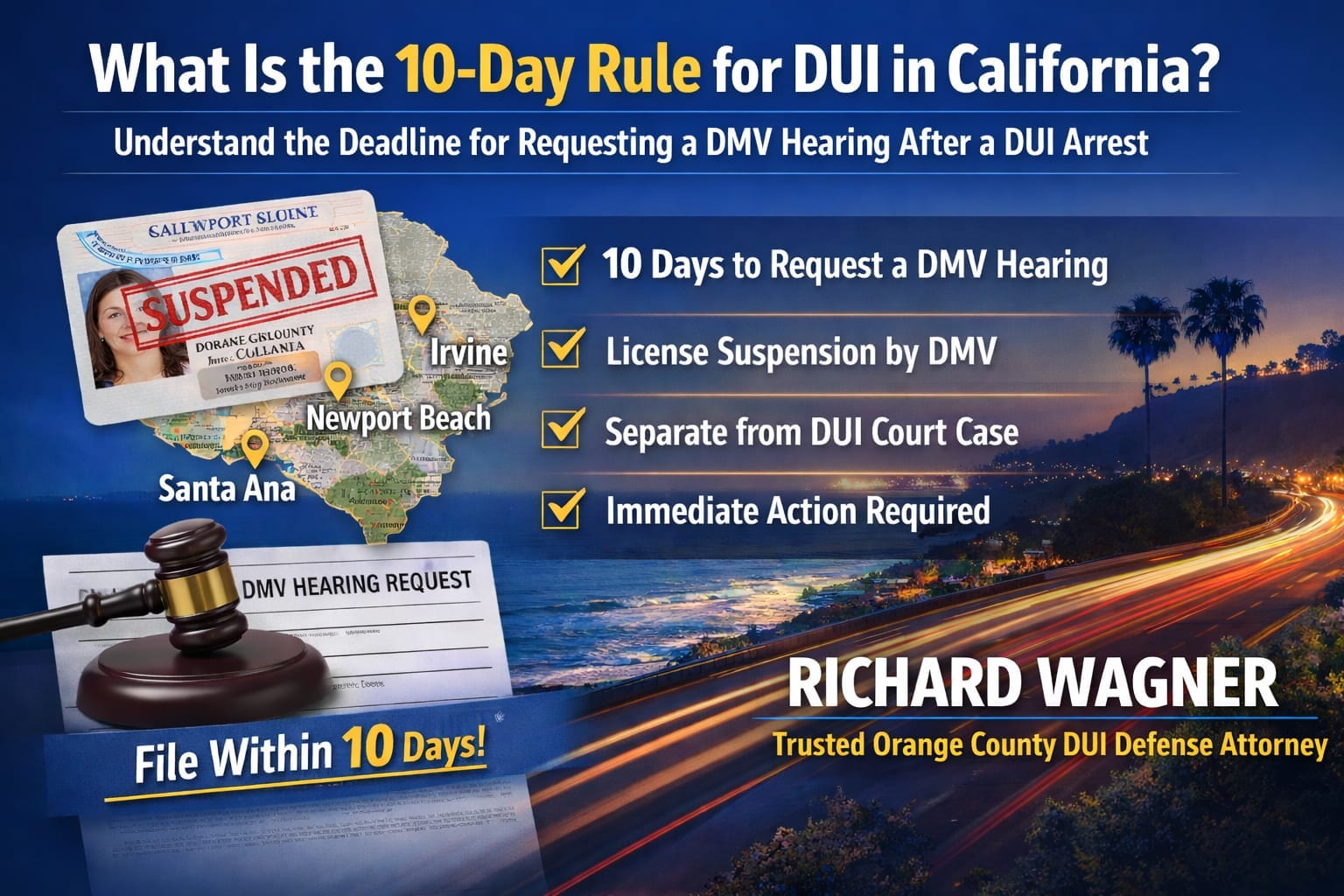Can Police Search My Car Without A Warrant?
Under California law, officers may conduct a warrantless vehicle search if they have probable cause to believe the car contains an unlawful amount of marijuana. This legal principle, known as the automobile exception, allows police to search a vehicle — including closed containers — when the totality of the circumstances suggests a marijuana law violation. In this article, former prosecutor and DUI defense attorney Richard Wagner explains how California courts evaluate probable cause, when marijuana odor may justify a search, and how recent appellate rulings impact your Fourth Amendment rights.
The automobile exception to the warrant requirement allowed police to search a backpack left in a friend’s car because the officer had probable cause to believe the car contained an unlawful amount of marijuana.
Because the officer had probable cause to search the car for an unlawful amount of marijuana, he then could legally search all compartments and containers within the car whose contents were not in plain view, including the backpack.
FACTS
The cop did not have a warrant. The search was based on the automobile exception to the warrant requirement. The trial court ruled the automobile exception authorized the search because the cop who searched had probable cause to believe the Jeep contained an unlawful amount of marijuana.
Defendant filed an appeal on the grounds that the totality of the circumstances failed to supply the officer with “probable cause to believe there was an illegal amount of marijuana in the vehicle, as opposed to the presence of a legal amount.”
Sergeant Hall of the Sacramento Police Department testified at the suppression hearing that he saw a Jeep parked on a curb. Sergeant Hall observed Mr. Moore leaning into the open front passenger door of the Jeep. When Sgt. Hall parked his patrol car behind the Jeep, Mr. Moore walked away to the middle of the park – a high-crime area.
Sergeant Hall approached the individual sitting in the driver’s seat, Brian Bennett. When Sgt. Hall reached the Jeep, Mr. Bennett opened the driver’s side door and a “strong” smell of “fresh marijuana” escaped from the Jeep.
Mr. Bennett appeared nervous. Sgt. Hall asked Mr. Bennett if there was any marijuana in the car. Mr. Bennett said there was not. Mr. Bennett then showed the sergeant an “empty glass mason jar that looked like it had marijuana residue in it” and claimed there had been marijuana in the car, which Mr. Bennett had recently smoked.
When asked if there was anything illegal in the Jeep, Mr. Bennett replied, “[n]ot that I know of.” Sgt. Hall also asked Mr. Bennett about the backpack on the front passenger floorboard. Mr. Bennett said that his friend left it there. During Sgt. Hall’s interaction with Mr. Bennett, the sergeant testified that he noticed Mr. Moore watching from a gazebo in the park.
At that point, Sgt. Hall decided to search the Jeep for an unlawful amount of marijuana and detained Mr. Bennett. When Sgt. Hall picked up the backpack, Mr. Moore approached and claimed the backpack.
Sergeant Hall opened the backpack and found a jar containing approximately one-quarter pound of marijuana. He also found a loaded .40-caliber handgun, digital scales, “narcotic[] packaging” materials, a cell phone, and a wired charger for an ankle monitor.
COURT OF APPEAL RULING
The Third Appellate District of the Court of Appeal of California affirmed the trial court’s denial of the motion to suppress. The court noted that warrantless searches are “per se unreasonable … subject only to a few specifically established and well-delineated exceptions.
One such exception to the warrant requirement is the automobile exception, which allows for warrantless searches of automobiles where an officer has probable cause to believe the vehicle contains contraband or evidence of a crime. Probable cause to search exists “where the known facts and circumstances are sufficient to warrant a [person] of reasonable prudence in the belief that contraband or evidence of a crime will be found.”
The Court further noted that “probable cause is a fluid concept—turning on the assessment of probabilities in particular factual contexts—not readily, or even usefully, reduced to a neat set of legal rules.”
The Court of Appeal concluded that all the facts taken together with Sergeant Hall’s training and experience established probable cause. The court was not persuaded by Defendant’s argument that because it is legal to possess up to 28.5 grams, or about one ounce, of marijuana, Sergeant Hall lacked probable cause to search the Jeep based on Mr. Bennett’s admission of having recently smoked, and Mr. Bennett’s presentation of an empty mason jar with marijuana residue.
The Court said that “section 11362.1, subdivision (c) does not apply when the totality of the circumstances gives rise to a fair probability that an existing marijuana regulation was violated when the search occurred. Moreover, Sgt. Hall articulated a reasonable basis for his belief Mr. Moore possessed an unlawful amount of marijuana.
The Court acknowledged that each fact in isolation would not support probable cause, but among the broader totality of circumstances, the Court concluded Sergeant Hall had probable cause to search the Jeep for an unlawful quantity of marijuana.
Therefore, the court reasoned Sgt. Hall could search all “compartments and containers within the vehicle whose contents are not in plain view,” including defendant’s backpack.
The citation for this opinion is People v. Moore (2021) 64 Cal. App. 5th 291
If you have been arrested, contact The Law Office of Richard Wagner for a FREE Consultation at 714-721-4423.


